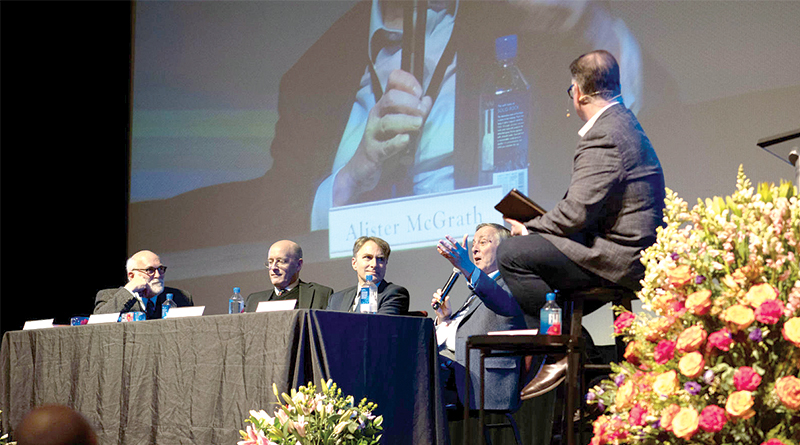Reaching a Fractured World
THIS IS an abbreviated version of the panel discussion that concluded the Mere Anglicanism Conference held Jan. 26-28 in Charleston, S.C. The theme of the conference was “Telling a More Beautiful Story: Lessons from C.S. Lewis on Reaching a Fractured World.” Only four of the seven speakers could stay for the panel. They were the Rev. Dr. Michael Ward, Oxford professor and Lewis scholar; Dr. Jerry Root, Professor Emeritus at Wheaton College; Dr. Alister McGrath, Oxford professor and theologian; and Dr. Simon Horobin, Professor at Magdalen College, Oxford. The moderator was the Rev. John Dickson, Professor at Wheaton College.
MODERATOR John Dickson: What were the roots of C.S. Lewis’ imaginative pizzaz?
MICHAEL WARD: He was unusually attuned to beauty.
MODERATOR: Then what hope is there for the rest of us?
WARD: Make an attempt to read widely. But not everybody has to be a poet or a writer or an intellectual. There are as many ways of being a Christian and telling the beautiful story as there are Christians. We each have our own particular language. And although Lewis is particularly rich and insightful and helpful, there are many other ways of going about it.
MODERATOR: How does one engage with a happy pagan?
JERRY ROOT Any of us can ask a public question of a person that’s not intrusive. I asked one young man at an airport, ‘Are you from here?’ He said, ‘No, but we moved here when my parents divorced.’ He didn’t have to tell me that. I think you can go deeper and deeper when people give you permission.
ALISTER MCGRATH: People are amusing themselves to death because they do not want to think about big questions, because they’re frightened of them. That’s why funerals are such interesting occasions. In funerals you are confronted with the harsh reality of mortality. What happened there will happen to you. Are you ready for it? There is a fear of ultimate questions and fear of accountability. Our task is to provide a safe space in which people can talk about these things. They know they’re there. But they’re frightened and they don’t want to talk about them. And they don’t want their friends to know they’re talking about them. …Once you know why the anxiety is there, that might give you clues on how to engage them.
God has hard-wired us with longing.
MODERATOR: Where do we see the best examples in non-Christian culture of conveying powerful stories?
WARD: Film and TV. Quite a lot of happy paganism is depicted in film and TV. The trouble is it’s not so happy. It doesn’t know there is something better out there. It offers up cheap or short-circuited stories, unsatisfying narratives which kill time and numb the nerves of your deep desires. Much popular culture is anesthetizing people. But the better works of cinema and TV, even if they are not Christian, are asking difficult questions and searching for deeper answers. We desire to be happy. We seek happiness in the wrong places. But that desire, however distorted, speaks to something true.
ROOT: In the recent PBS documentary of Hemingway we see a man groping, trying to find meaning in life. He had deep longings. I could have gone that route. Thank you, Lord, you wooed me to yourself through those longings. Same in a documentary on Mark Twain, there was that groping and longing. Powerful.
SIMON HOROBIN: Philip Pullman in His Dark Materials trilogy is seeking to engage with Lewis and his Narnia series in a very public and confrontational way.
WARD: Many people would have seen the film adaptation of Pullman’s first volume The Golden Compass. A lot of what Pullman says in his trilogy a lot of Christians can agree with, which is he is against religious enforcement, theocracy, manipulating people to believe things they don’t really believe. He’s got this idea of religion in a theocratic sense, this all-powerful God who has a church that just oppresses people. He is not really attacking Christianity and there is no Christ character in his books. He is just so blinded by his anger and hurt that he cannot see the goodness of Christianity and so he doesn’t present it in his books.
MCGRATH: What you need to know is what is the story of why a person [like Pullman] is an atheist. Really engage with the issue of what happened to them, what really matters to them. We have these generalized approaches, like “Here is what you say to an atheist.” People are atheists for reasons so let them tell their story, which then gives you the opportunity to tell a more beautiful story. It might not address all the issues but it might at least plant some seeds of doubt.
MODERATOR: The better story is the gospel. In one sentence what would you say is the good news that C.S. Lewis offers the world?
ROOT: It’s the old gospel: God loves you. Christ died for your sins. You can be reconciled to him.
WARD: There’s a line in The Voyage of the Dawn Treader I like where Prince Caspian, who had just destroyed the slave trade on the lowlands is lambasted by the slave trader Pug who whines, “You’re destroying my livelihood. Do you mean to make a beggar of me?” And Caspian replies, “It’s better to be a beggar than a slave.” I think there is a very profound truth in that spiritually. It’s better to be a beggar for Christ’s righteousness than to be a slave to sin.
HOROBIN: I like the line in The Lion, The Witch and The Wardrobe where the three older children go to see the old professor because they’re worried about Lucy’s sanity and he says to them, “How do you know that what your sister is saying isn’t true?”
MODERATOR: Alister, what is the gospel of C.S. Lewis?
MCGRATH: Step into this beautiful story, which will transform you because it’s true and it’s real. TAP
For more on the Mere Anglicanism conference, see “By his wounds we are healed” on p. 3 and “What the Narnia books can teach us” on p. 4 of this issue as well as “Telling a More Beautiful Story” in the Lenten issue of The Anglican Planet.




